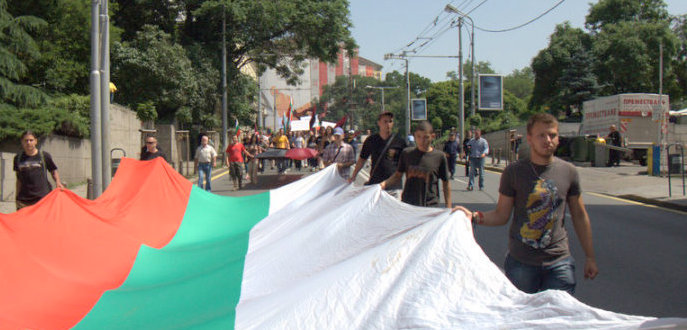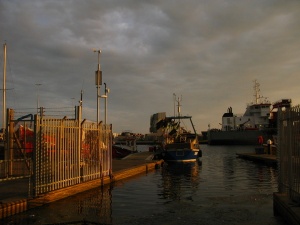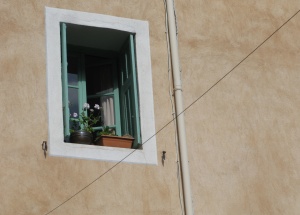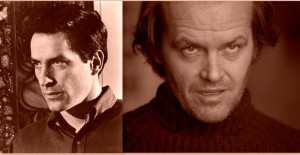When Boyan Rashev wrote into Dnevnik, it was the 17th day of protest in Bulgaria. Today it is the 22nd. International media outlets such as the Economist, the FT and the New York Times have been reporting on the events, remarking on the contrast with previous protests and the climate of widespread distaste for the political elite. The participant in these events of contention, like Rashev, are younger, educated and entrepreneurial. They are not protesting energy prices, but the persistently corrupt and incestuous nature of the ruling upper stratum. Rashev’s view is that it is clear that the many demands he and his co-protestants have could only result in the dissolution of parliament and new elections – a view all too easy to hear around Bulgaria right now. He compares the current members of parliament to pigs, who have in turn made the National Assembly into a pig-pen.
Unlike international news outlets, this local article, circulated around my friends and former research participants, captures something more than the structural elements of political and social schisms which lead to such events. It captures a certain mood, the way-markers of wide-scale social identity which I came to know so intimately during my ethnographic fieldwork in Bulgaria. In his description below ‘The Party’ needs no clarification. Transition away from the Soviet model means ‘the Party’ is commonly understood code for the Socialist (previously Communist) elite – in this context it is also the newly elected leading party in parliament. The author feels he needs to clarify that the protesters ‘are clearly well’ because he knows it is commonly believed that that are many people who are ‘unwell’ in Bulgaria, especially those who frequently protest in the streets. In my thesis I discussed this under the rubric of the ‘ill nation’ which makes its people ill too. When he talks about people in their twenties he assumes we know that Bulgaria is suffering under a serious case of outward migration, people wanting ‘to stay’ in the country is something of note.

Fundamentally the statement which I have translated below is a manifesto about change, and what it would take to create change. In my PhD thesis, I argued that the Bulgarian public milieu was particularly infused with a worry about the damaged psyche of its population. This motif is an old one – harking back to the late 19th century and the attempt to make peasants into citizens. Since then, the Bulgarian intelligencia have been persistently reflecting on what it takes to create consistently moral citizens, despite the condition of persistent social flux and fundamental changes to markers of ‘proper behaviour’.
Rashev writes this piece from the perspective of a new kind of citizen, a survivor, an tough-character, an endurance runner. It is an archetype which I encountered in many forms in contemporary Bulgaria. In a country of many hurdles and problems, compassion is pushed to the side in favour of admiration for those who ‘make it’. Yet Rashev’s writing below insists on another division- that between the people who make it and preserve some sense of morality and those who succeed and occupy power, but lack any common virtues.
The text roughly translated below is a battle cry of a specific kind – one which sifts the good from the bad, establishes common norms and presents the protests as a search for morality and normalcy.
————–
They [the current government] are sure that we [the protesters] will shout for a while, will have a stroll or two, will sign a few documents and chatter, complain and eventually give up and go mind our own business. Because it has always been like this, such are the Bulgarians … or at least those who they know.
They are underestimating us greatly!
Other than being a protester, a husband, a father, an entrepreneur and a manager, I have a hobby. It is called ultramaraton or running without rest over vast distances over rough terrain. The protesters prevented me from participating in the Vitosha 100 kilometers. (I’m furious – I have been waiting for it for the past year)
What does this mean for them?
It means that I am able to withstand fatigue, thirst, hunger, heat, cold and insomnia, as well as strong, persistent and increasing pain indefinitely and nevertheless continue to move towards my goal with the unwavering confidence that eventually I will reach it – no matter how far and how impossible it seems. The more there are of the above conditions, the greater, the pleasure of persevering to go forward!
It means that they are screwed because I just do not give up. I rarely miss a protest. I look at the people who are protesting with me and I cannot believe my eyes. I listen to their words and do not believe my ears. I talk to them and feel as if I am leading a monologue.
I see myself a thousand times. Fathers (and mothers) in their 30s with young children who are obviously well . Managers and entrepreneurs, artists and professionals who are of the same breed of people as me – who just do not give up! Confident because they have achieved something, despite those in the pig-pen [what the National assembly has been turned into].
I see myself 10 years ago. Young people in their early 20’s. Educated and full of hopes and dreams. Europe is at their feet – no visas and borders. But they want to stay or come back and look for reasons to do so. They love Bulgaria and want a future here. They seek opportunities and look to us because we create them.
I see the generation of my parents. Some realize what they have achieved and how easily they can lose it. Others know what they ‘have done’ and come to make up for their inaction. Everyone knows the wickedness of the Party better than us and they are here to protect us. Us and our children. Because they love us.
I see our children. For them it’s a jolly parade and we will try and make sure they remember it as such. They will be proud to have been here because this will go down in history.
I see myself a thousand times. They look at us and cannot see us as they know only lust, gluttony, avarice, sloth, anger, pride and envy. They are blind to that which is clean. They do not know that we exist.
We are the generation of the transition – those who withstood it and did not allow the tide to drag them abroad. We remember communism, but it has not distorted our consciousness. We are seasoned in the years of change, but they have not broken our dreams. We value Bulgaria’s progress, but we know what it could be and we want more. We know that not everyone is a trickster (maskari), because we do not consider themselves as such.
We have achieved everything with persistence and struggle – they offer us meagre child allowances. We bear a morality that they think they have deleted from the genes of the Bulgarians. We do not want much from them – just legality and security – and they offer us Bolen and Debeleevski[1]. We want to love both our homeland and our state, and they make us detest it, in their bid to have it to themselves. We are a nation that wants freedom and democracy, and they think we are a nation that is used to bearing the yoke[2].
“We are not paid, we are the ones paying.”
We invent, we create, we produce, we provide. The whole country and everyone who gets something out of it, moves and twitches primarily due to us. We have the right of veto and should use it. Every month I pay in, on behalf of my company and its employees, over ten thousand leva. What would happen if I stop paying them until they fulfil our only request? It is not in violation of the law – it will just accumulate interest which I will gladly pay. But not to them! How long will they last if many others also do so too? I do not think that will celebrate the 9th of September[3].
Please not that the photo is from another protest – it’s simply for illustration purposes.
[1] Mocking nick-names for two highly contentious political figures who came into power as a result of the last elections.
[2] A common idea harking back to the times of the Ottoman empire- when the Bulgarian people are said to have been slaves, or ‘under the yoke’.
[3] This is a double-edged reference, alluding to both a close time-frame and to the date on which the Communist party took power in Bulgaria in the 40s.









